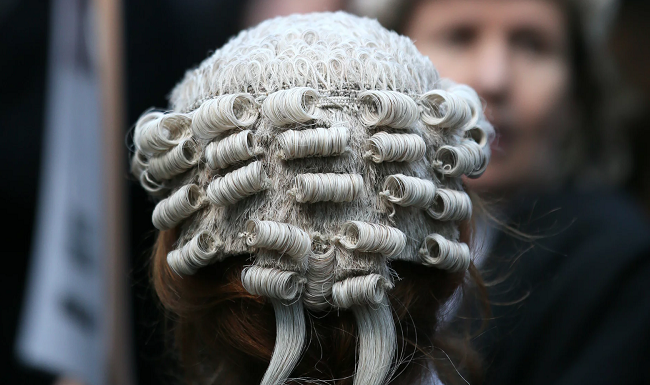Criminal barristers are preparing to step up their protests over cuts to fees as Labour calls on the government to abandon a payments scheme for publicly funded cases.

More than 90% of surveyed members of the Criminal Bar Association (CBA) have come out in support of stoppages, the organisation has revealed, while about 100 barristers chambers in England and Wales are refusing to work on new legal aid instructions.
The CBA represents more than 4,000 criminal barristers. Its executive has met to discuss “escalating the action” and the first days of action are expected later this month. Criminal barristers may also decline to handle cases returned by other lawyers who cannot get to court – cooperation that normally relieves strains in the criminal justice system.
There are an increasing number of reports of defendants being left unrepresented at remand hearings across England and Wales because of the lack of counsel prepared to take on new legal aid crime cases.
All MPs are to be given a free copy of the book The Secret Barrister: Stories of the Law and How it is Broken, and the Young Legal Aid Lawyers’ Social Mobility Report 2018, which highlight the funding shortages in the criminal justice system. They have been paid for trhoug crowdfunding on the CrowdJustice site.
Labour has secured a vote in parliament on the disputed advocates’ graduated fee scheme (AGFS), which barristers say will leave criminal defence lawyers underpaid for publicly funded work in the crown court. They would not be fairly rewarded for reading the material now being disclosed in even routine crime cases, they maintain.
Richard Burgon, the shadow justice secretary, has called on the government to withdraw controversial changes that have sparked industrial action by barristers.
As a result of the new scheme about 100 barrister chambers have refused to take on new publicly funded cases since 1 April.
Burgon said: “The government should withdraw these controversial changes, go back to the drawing board and come up with a scheme that attracts widespread support rather than provoking a backlash.
“Our justice system depends on those accused of serious crimes having access to proper legal representation. Without that there is greater risk of miscarriages of justice.
“This flawed scheme risks causing further damage to our justice system, which is already in a crisis driven by 40% budget cuts – the deepest cuts of any government department.”
Angela Rafferty, chair of the CBA, said: “We remind the government that no barrister wants to take this action. Our repeated calls for a principled and practical solution stand. Justice should be placed in its rightful place. Investment across the system is required.”
The Public Defenders Service, a small government agency that only appears at times of dispute, is understood to be ready to take on cases. A Ministry of Justice spokesperson said: “Any action to disrupt the courts is unacceptable and we are taking all necessary steps to ensure legal representation is available for defendants in criminal cases.
“We greatly value the work of criminal advocates and will continue to engage with the bar over their concerns regarding the AGFS scheme.
“Our reforms replace an archaic scheme under which barristers billed by pages of evidence. Murder is one of the many categories of cases which will see an uplift in fees under the new scheme.”
The MoJ says that the new AGFS scheme will cost it £9m more than originally intended.
(Published by The Guardian, May 08, 2018)